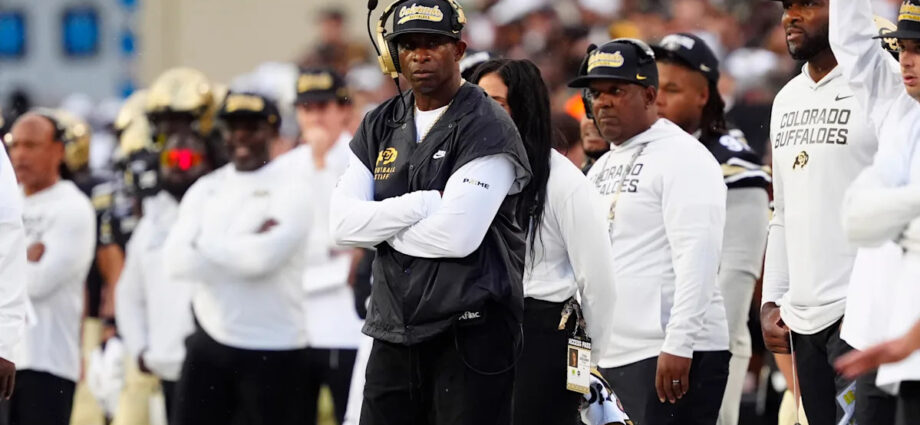For a second time on Tuesday, Deion Sanders addressed his clock management at the end of Colorado's 27-20 loss to Georgia Tech.
For a second time, the Colorado coach insisted that he didn't do anything wrong. This time, he detailed why he thinks that he didn't make any late clock-management mistakes in a game in which he left two timeouts on the table as time ran out on regulation.
Here's Sanders at his news conference talking about his decisions in the final 1:07 of the game in which Colorado failed to advance into Georgia Tech territory while in possession of two timeouts and in need of a game-tying touchdown.
Coach Prime wanted to clear up why CU did not use its last two timeouts with 1:07 left in regulation vs. Georgia Tech 👀 pic.twitter.com/Qa3V97DaWR
— Yahoo Sports (@YahooSports) September 2, 2025
“OK, let's just get the cat out of the bag,” Sanders said. “First down, we throw a lateral pass, right? We lose four or five yards? Do you call a timeout there?
“No, you're right there, you don't call a timeout. You gotta go, you gotta go. We're at a tempo, right?”
On the play that Sanders described, Colorado ran a screen pass on first-and-10 that got blown up in the backfield for a 2-yard loss at the Colorado 23-yard line. Colorado snapped the ball on the play with 1:07 remaining on the game clock. Running back Micah Welch was tackled with 1:02 remaining on the clock.
[Join or create a Yahoo Fantasy Football league for the 2025 NFL season]
Colorado did not call a timeout. By the time the Buffaloes snapped the ball for the next play, 17 seconds had run the game clock down 45 seconds. Per Sanders, he didn't preserve those 17 seconds because he wanted the offense to maintain its tempo.
What about the next play?
Sanders went on to describe another play in question in which substantial time ticked off that could have been saved.
“So the next play, what, you gain I guess, 14 yards, whatever?” Sanders said “Now you’ve got third-and-1, right? Do you call a timeout there?”
Sanders, again, answered his own question with another.
“Third-and-1. You get the first down, clock stops, correct?” he continued. “So you get the first down, the clock stops.
“Scramble play. He ran out of bounds, the clock stops, right? Now we throw the ball out of the end zone. The clock stops. Right? So when was the time to call timeout?”
Here's that sequence:
This is the worst clock management I’ve seen in years
— College Football Report (@CFBRep) August 30, 2025
Quarterback Kaidon Salter completed an 11-yard pass to receiver Hykeem Williams to the Colorado 34-yard line, putting the Buffaloes at third-and-1 with 40 seconds remaining on the running clock.
At this point, ESPN's broadcast booth was imploring Sanders to burn a timeout. Again, as Sanders explained, he declined to do so.
By the next snap, another 11 seconds had run the game clock down to 29 seconds. When the ensuing play was done, the clock stopped at 18 seconds when Salter ran out of bounds at the Colorado 39-yard line after a 5-yard scramble.
In total, the two-play sequence took 27 seconds off the clock. Eleven of those seconds amounted to dead time between plays. And the second play was a rushed scramble that ate up another 11 seconds.
Would calling a timeout have resulted in a more efficient play? Maybe? It certainly would have saved those 11 seconds of dead time.
The end result left Colorado in need of a miracle. The Buffaloes had 61 yards between them and the end zone with 18 seconds left on the clock. They didn't make it past midfield before the game clock expired.
Sanders maintains that there were no spots to use Colorado's two remaining timeouts. The game tape suggests otherwise.


